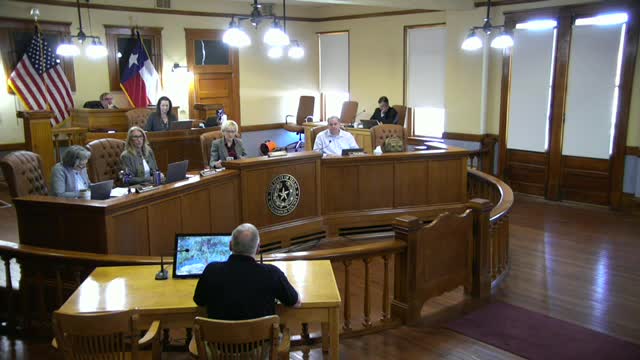Williamson County delays decision on FEMA grant for tornado sirens in Granger and Weir
Get AI-powered insights, summaries, and transcripts
Subscribe
Summary
County emergency manager outlined a FEMA Hazard Mitigation Grant application to pay for two sirens in the towns of Granger and Weir; commissioners raised questions about city commitments, ongoing maintenance and county administrative costs and agreed to defer action to a future meeting.
Williamson County Commissioners Court on April 8 deferred action on a proposed application to the Federal Emergency Management Agency Hazard Mitigation Grant Program to install tornado warning sirens in the towns of Granger and Weir.
Bruce Clements, director of the Williamson County Office of Emergency Management, told the court the county would apply on behalf of the two towns because they are not eligible to apply directly. He said each siren costs about $39,000, with FEMA expected to cover $30,000 and the city covering $9,000, and that the county’s role would include preparing the application, establishing memoranda of understanding (MOUs) with the towns, and serving as a pass-through for FEMA funds.
The court’s discussion focused on whether the small towns understood the ongoing responsibilities that accompany federal grants. Commissioner Long and others stressed that cities must commit to maintenance, procurement requirements and potential upfront costs, and that county staff time and the use of a grant writer are not cost-free to the county. Commissioner Long said she wanted confirmation from Granger and Weir that they understood and could meet those obligations before the county applied.
Clements told the court there is a submission deadline in mid-April but that applications can still be entered afterward; he described the state and FEMA review process as taking several months.
After extended discussion about bandwidth in small-city administrations, maintenance and procurement rules tied to federal funds, the court agreed to postpone a final decision and asked staff to return next week after obtaining commitments from Granger and Weir about their ability and willingness to fulfill the grant conditions.
The county did not vote to apply at the April 8 meeting. Court members emphasized the need for MOUs that clarify each city’s responsibilities and for confirmation that the towns can provide the required local contribution and handle procurement, installation power, and maintenance before the county serves as applicant and fiscal pass-through.
If the court approves the application later, the county would act as applicant and pass-through; the actual installation, operation and long-term maintenance obligations would rest with the respective cities under the MOUs discussed by the court.
